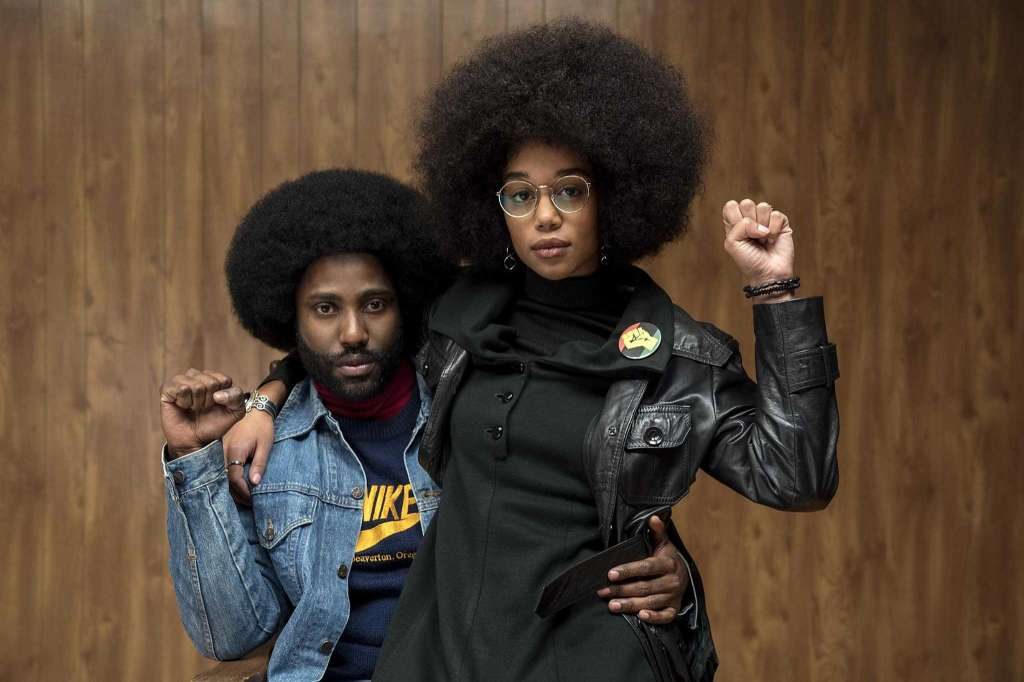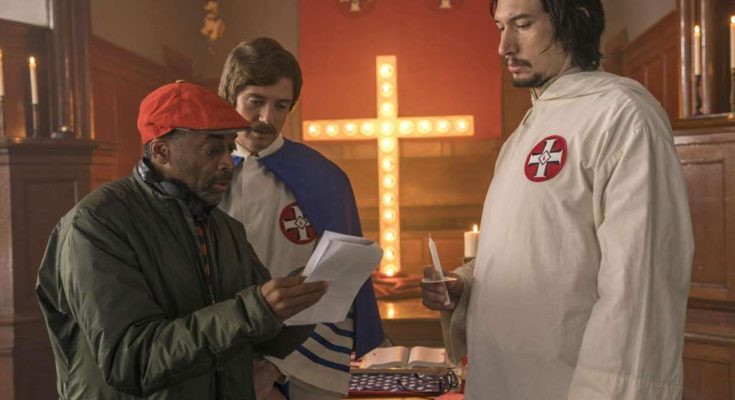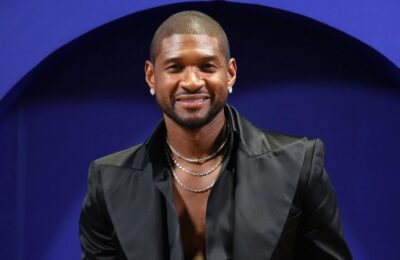In “BlacKkKlansman,” a young black detective penetrates the Ku Klux Klan in Colorado in the 1970s. The latest Spike Lee joint, as the director calls his films, is a hybrid of drama and comedy, lurching at its end to documentary footage of the bloody Charlottesville, Va., march of extreme right groups in August.
The film shows video footage of Klan leader David Duke, a march participant, quoting Donald Trump on the need to “take America back.”

“That ain’t fake news. That’s not fake film. That is real,” Lee declared. “Spike Lee did not take that footage to my friend George Lucas at ILM and say, ‘Fix this.’”
“There’s two words that have been prominent in my films, going all the way back to ‘School Daze’ in 1988, and those two words are ‘Wake up.’
“‘School Daze’ ends when Giancarlo Esposito and Laurence Fishburne look to the camera and say, ‘Wake up,’ looking at the audience,” Lee said. “My next film, ‘Do the Right Thing,’ begins with Samuel Jackson saying, ‘Wake up.’”
“So I’ve been saying that since 1988,” he said. “Somebody says, ‘Wake up,’ I think, four times in this film.”
This year marks the 32nd anniversary of Lee’s no-budget debut feature, “She’s Gotta Have It,” an indie sensation when that field had few black directors whose names anyone knew. Lee was just out of New York University film school, where he now has tenure. “She’s Gotta Have It” has a new life today, as a Netflix series.
By the time his first feature premiered, Lee said, he had already made his first film about the Klan, a student project called “The Answer,” in his first year at NYU. Lee conceived of “The Answer” in response to D.W. Griffith’s heroic depiction of the Klan in “The Birth of a Nation” and to what he says was ignored about that film’s legacy.
“My problem with the film was the social impact of the film, how it led to the rebirth and re-emergence of the Klan, how President Woodrow Wilson said it was like ‘writing history with lightning.’ This was directly related to black people being lynched, castrated — and that was never discussed in class,” he recalled.
Lee hesitated. “I’m not one of these people who say that “Huckleberry Finn,” one of the greatest American novels, should not be taught in class because of the word ‘n—,’ — that, or Harper Lee’s “To Kill a Mockingbird,” he said. “I thought, let’s have “The Birth of a Nation” in class, but let’s have an expansive discussion of it and not leave s— out. So my film ‘The Answer’ was, ‘you left s— out,’” he said.
It’s now more than 30 years later. Scenes from the 1915 Griffith epic of Klansmen on horseback defending the white race from freed slaves and treacherous whites in blackface appear and reappear throughout “BlacKkKlansman.” Lee’s film rejoins Klan history in the 1970s, when Ron Stallworth (John David Washington) was the first black cop in Colorado Springs.
Lee learned of Stallworth’s memoir of the same title when he got a call from Jordan Peele, director of the 2017 independent hit “Get Out,” which was nominated for a best picture Academy Award. Peele had acquired Stallworth’s book and sent Lee a script based on it. Peele, who once thought he might direct it, is producer of “BlacKkKlansman.”
“When they said Spike Lee, I broke out into a great big grin,” said Stallworth, 65, who spoke over the telephone from El Paso, Texas, where he now lives.
In Stallworth’s memoir, the young detective telephones a local Klan office after he sees a Klan ad in the newspaper. Fluent “in English and jive,” as he described black English, Stallworth professed his hatred for blacks over the telephone and applied for membership. A white cop who happened to be Jewish, Flip Zimmerman (Adam Driver in the film), became his undercover surrogate in the flesh. Soon the two Ron Stallworths, on the phone and in person, were trusted Klan members. The black Stallworth still has his membership card.
Eventually Stallworth found a new phone friend, the Grand Wizard David Duke himself. When Duke traveled to Colorado Springs to rally Klan members, Zimmerman met him in person, and police supervisors assigned Stallworth, a black cop, to be the Klan leader’s security detail. That status gave the black Stallworth access to Klan events during Duke’s visit.
Lee’s script, co-written with Kevin Willmott, burnishes the historical record with a beautiful girlfriend for Stallworth, a menacing police traffic stop of black leader Kwame Ture (earlier known as Stokely Carmichael), and a deadly Klan bombing. Outdoor shots for the story set in Colorado were filmed in Ossining, N.Y.
Stallworth, who says he likes the film, said Lee Hollywood-ized the story. “There was no bombing. The Klan was planning to bomb a gay bar,” he said, “so his plotline fit in with their plans.”
Lee pleads guilty to injecting drama. “There isn’t a film that’s been made in the history of cinema where there hasn’t been some embellishment. The title doesn’t say, ‘This is based on a true story.’ The title says, ‘This is based on for real, for real s—.’
“If that’s a criticism, that doesn’t bother me,” the director added, “I remember my mother telling me, ‘Cleopatra did not look like Elizabeth Taylor.’ ”
By way of explanation, Lee said, “My mother loved movies. My father hated movies. And I’m the eldest, so I was my mother’s movie date. She had a thing about Cleopatra.”
More convincing than Elizabeth Taylor as Cleopatra for Lee was Topher Grace’s David Duke, fastidiously groomed and wearing a hairpiece as the Klan’s Grand Wizard in that era. “Topher killed it,” the director said with a serene expression.
John David Washington, Denzel’s son, plays Stallworth as an earnest young cop with a ’70s Afro and a persuasive phone voice. At age 6, he played a child in Lee’s “Malcolm X.” Lee cast him as Stallworth without an audition. “I told him I knew him before he was born. We’re family,” Lee said.
Ron Stallworth recalled that “when they asked who I wanted to play me, I said, ‘Denzel Washington.’ But I was 25 when the incidents in the book took place. I thought, ‘OK, I can’t get the daddy, so I got the son.’”
Thinking back 40 years, Stallworth recalled, “When I was dealing with David Duke, I was feeding information from him regarding where they were going to be marching, what cities around the country.
“After he would tell me, I would hang up and I would call the police departments in those cities to alert them that at such date and time, David Duke and his Klan forces would be in your city, conducting a march and possible cross-burning. They would inform their troops, and when Duke would show up with his people, he would find an organized effort in place to counteract that,” he said.
“Duke, when he called me back, would tell me how surprised he was at the preparedness of local police in those area.”
In watching the Charlottesville riots at the end of Lee’s film, Stallworth said, “None of that surprised me. The Klan naturally recruits those disgruntled people who today we would call Donald Trump supporters. That’s the natural base for groups like the Klan.
“Donald Trump is the physical embodiment of what David Duke wanted to accomplish 40 years earlier.”
Lee disputed that his film was targeting Trump, whom he calls Agent Orange — “I can’t say his name.”
“I don’t approach my films by saying who’s the target. I use the word ‘story’ instead of ‘target.’ There has to be a story,” he said. “Just the premise of this film is high concept. A black man infiltrates the Ku Klux Klan. That’s all you’ve got to say. How many words is that?
“Eight words,” he shouted. “Those eight words tell the entire story. You can’t get more Hollywood than a movie that can be described in eight words. That’s high, high, high concept.”
The conversation shifted to a practical subject, the Klan robes worn in “BlacKkKlansman,” and whether Lee had burned them or was saving them for a sequel. “There’s no sequel,” he said, laughing. “We made them. I don’t know where they are. I gotta get ‘em before they go on eBay.” (David D’Arcy is a New York freelance writer.)
“BlacKkKlansman” opens in Bay Area theaters Friday, Aug. 3.





